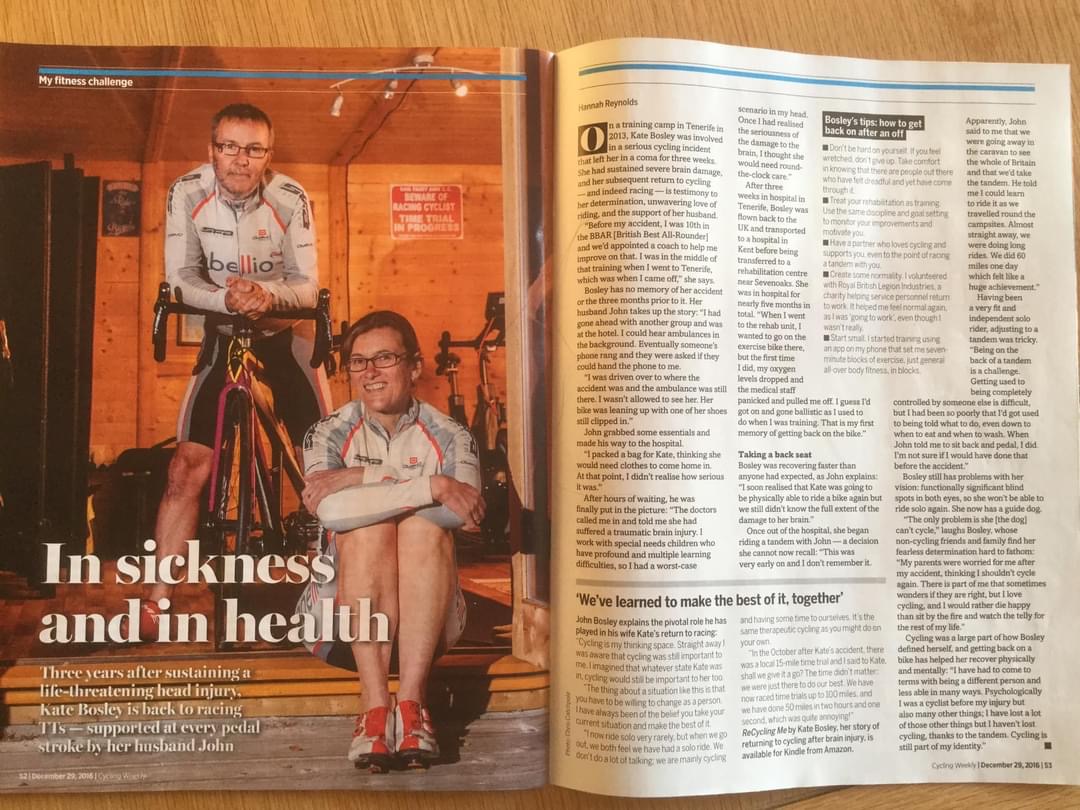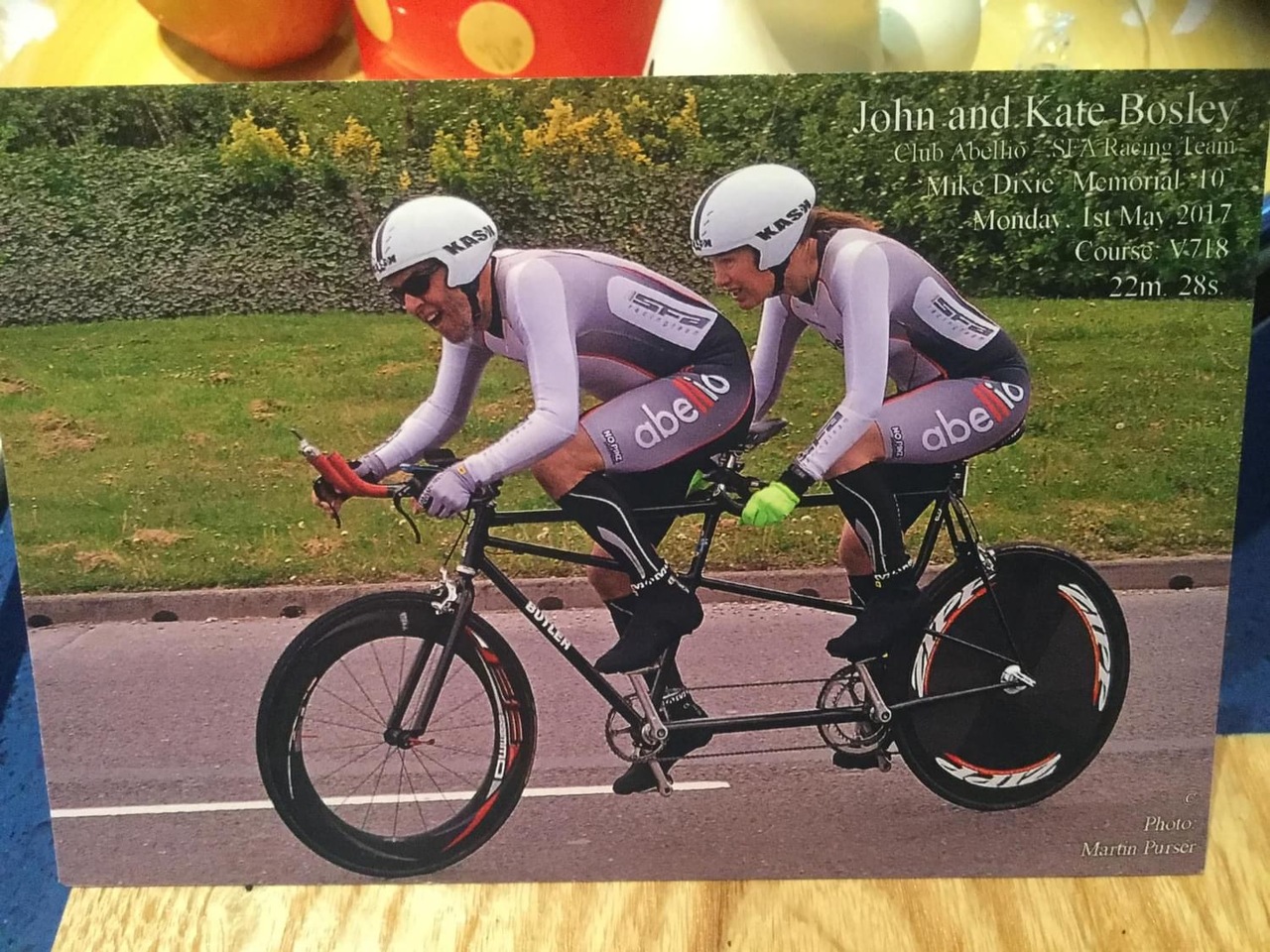
Why Snails around France is about a tandem cycle.
The book is about a 7,000km ride round France on our tandem.
A few years ago this might not have seemed possible, this article in Cycling Weekly explains what happened to Kate.
IN SICKNESS AND IN HEALTH
Cycling Weekly article (29/12/2016)
Three years after sustaining a life threatening head injury, Kate Bosley is back to racing TTs - supported at every pedal stroke by her husband John
On a training camp in Tenerife in 2013, Kate Bosley was involved in a serious cycling incident
that left her in a coma for three weeks. She had sustained severe brain damage, and her subsequent return to cycling - and indeed racing - is testimony to her determination, unwavering love of riding, and the support of her husband "Before my accident, I was 10th in
the BBAR [British Best All-Rounder) and we'd appointed a coach to help me improve on that. I was in the middle of that training when I went to Tenerife, which was when I came off," she says.
Bosley has no memory of her accident or the three months prior to it. Her husband John takes up the story: "I had gone ahead with another group and was at the hotel. I could hear ambulances in the background. Eventually someone's phone rang and they were asked if they could hand the phone to me. "I was driven over to where the accident was and the ambulance was still there. I wasn't allowed to see her. Her bike was leaning up with one of her shoes still clipped in.
John grabbed some essentials and made his way to the hospital. "I packed a bag for Kate, thinking she would need clothes to come home in. At that point, I didn't realise how serious
it was."
After hours of waiting, he was finally put in the picture: "The doctors called me in and told me she had suffered a traumatic brain injury. I work with special needs children who have profound and multiple learning difficulties, so I had a worst-case scenario in my head. Once I had realised the seriousness of the damage to the
brain, I thought she would need round- the-clock care.
After three weeks in hospital in Tenerife. Bosley was flown back to the UK and transported to a hospital in Kent before being transferred to a
rehabilitation centre near Sevenoaks. She was in hospital for nearly five months in total. "When I went to the rehabilitation unit I wanted to go on the Exercise Bike there but the first time I did, my oxygen levels dropped and the medical staff
panicked and pulled me off. I guess I'd got on and gone ballistic as I used to do when I was training. That is my first memory of getting back on the bike."
TAKING A BACK SEAT
Bosley was recovering faster than anyone had expected, as John explains: "I soon realised that Kate was going to be physically able to ride a bike again but we still didn't know the full extent of the damage to her brain."
Once out of the hospital, she began riding a tandem with John - a decision she cannot now recall: "Apparently John said to me that we
were going away in the caravan to see the whole of Britain and that we'd take the tandem. He told me I could learn to ride it as we travelled round the campsites. Almost straight away, we
were doing long rides. We did 60 miles one day
which felt like a huge achievement."
Having been a very fit and independent solo
rider, adjusting to a tandem was tricky,
"Being on the back of a tandem is a challenge.
Getting used to being completely controlled by someone else is difficult, but I had been so poorly that I'd got used to being told what to do, even down to when to eat and when to wash. When John told me to sit back and pedal, I did
I'm not sure if I would have done that before the accident."
Bosley still has problems with her vision: functionally significant blind spots in both eyes, so she won't be able to ride solo again. She now has a guide dog. "The only problem is she [the dog] can't cycle," laughs Bosley, whose non-cycling friends and family find her
fearless determination hard to fathom: "My parents were worried for me after my accident, thinking I shouldn't cycle again. There is part of me that sometimes wonders if they are right, but I love cycling, and I would rather die happy
than sit by the fire and watch the telly for
the rest of my life."
Cycling was a large part of how Bosley defined herself, and getting back on a bike has helped her recover physically and mentally: "I have had to come to terms with being a different person and less able in many ways, Psychologically. I was a cyclist before my injury but also many other things; I have lost a lot of those other things but I haven't lost cycling, thanks to the tandem. Cycling is still part of my identity."
BOSLEY’s tips: how to get back on after an off
Don't be hard on yourself. If you feel
wretched, don't give up. Take comfort
in knowing that there are people out there
who have felt dreadful and yet have come
through it.
Treat your rehabilitation as training.
Use the same discipline and goal setting
to monitor your improvements and
motivate you.
I Have a partner who loves cycling and
supports you, even to the point of racing
a tandem with you.
Create some normality. I volunteered
with Royal British Legion Industries, a
charity helping service personnel return
to work. It helped me feel normal again
as if I was going to work", even though I
wasn't really.
Start small. I started training using
an app on my phone that set me seven-
minute blocks of exercise, just general
all-over body fitness, in blocks.
'We've learned to make the best of it, together'
John Bosley explains the pivotal role he has
played in his wife Kate's return to racing:
"Cycling is my thinking space. Straight away I
was aware that cycling was still important to
me. l imagined that whatever state Kate was
In, cycling would still be important to her too.
"The thing about a situation like this is that
you have to be willing to change as a person.
I have always been of the belief you take your
current situation and make the best of it.
"I now ride solo very rarely, but when we go
out, we both feel we have had a solo ride. We
don't do a lot of talking; we are mainly cycling and having some time to ourselves. It's the
same therapeutic cycling as you might do on
your own”.
"In the October after Kate's accident, there
was a local 15-mile time trial and I said to Kate,
shall we give it a go? The time didn't matter:
we were just there to do our best. We have
now raced time trials up to 100 miles, and
we have done 50 miles in two hours and one
second, which was quite annoying!"

Post Views : 176